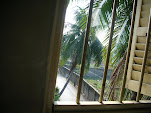Gopipur is less than a village and by the English Town and County Planning standards (if applied in this instance) it would probably rank as a hamlet or isolated farm. Gopipur has about 15 small huts, housing about 70 people. No school, no clinic, no post office, one tea-shop. Just acres and acres of hilly pasture land with sweet green grass and hundreds of cattle. The entire village depends on grazing and though they are not nomadic, they are certainly shepherds by occupation. Rearing milch cattle. Pure unadulterated milk is Rs. 10 a seer. They have not heard of kilograms. The rate is " dhai rupaiya pau". Sweet, thick creamy milk. Bela lives in Gopipur. Does not go to school. At least not in summer. In winter, when it is cold, a Masterbabu comes from the town, spends three or four months at Gopipur and teaches all the children the basics of grammar, arithmetic, alphabets and what not. Funnily enough all the children I met and the women too are more or less literate. They all read Hindi, and a little bit of English alphabets even the 5 year old knew. Left me wondering why we could not have the same system in the cities. School for 4 months. Holidays for 8 months!!!!!!
Any way coming back to Bela, her beloved Baba had been all the way to Pithoragarh (another small town in UP) and had brought back a pair of strappy tinsel coated sandals for Bela. For Bela that was the ultimate in fashion, and she dearly wanted to wear it. Her strict no-nonsense mother had put an embargo......not till Diwali. The footwear was kept wrapped in newspaper and sunned everyday (I never got to know why the daily sunning was needed), much admired by all the village folk as it glittered in the misty sunlight and all of this watched by the totally enraptured eight year old.
This pair of sandals and Bela's dark deep dreamy eyes took me back 45 years in a fraction of a second.
Long time back in the bleary and misty shores of East Anglia I spent a winter holiday. On the dead flat marshes of Suffolk it was an intensely cold winter. There was the high sea wall on which we used to walk and play. If you know this part of Suffolk, the sea wall near Lowestoft
is a lonely stretch, on one side lay the bleak grey sea, howling and raging with the wind which was always bitterly cold. On the other side of the sea wall lay the wide expanse of heathland, rimey grass dotted with winter-black whin bushes and dry gorse bushes. A wide pale sky touched the heathland somewhere far way. In this bleak landscape played Norah and Robin and of course yours truly. The sea wall was slippery and wet, and we ran along it as sure footed as only children can be. Norah was the daughter of the local P.C. and wore a pair of red leather shoes with bright silver buckles. I had never seen such a pair of shoes. All I got was the regular black boots for school wear and of course the three striped Adi Dassler hand crafted grey suede shoes. These Dassler shoes were good, comfortable but they could not match the clop-clop sound and the brightness that Norah's shoes brought while playing on the sea wall. All winter I yearned and longed for such a pair. I even went to the extent of asking Mother.
"Red shoes?", she said.
"What's wrong with the black shoes?"
Too bad Ma never understood these things.
The whole bleak winter we played and ran on the rimey heath, on the sea wall, on the straight sandy coast-road. All the time I longed to have a pair of red shoes. They never came. I stuck to my solid black boots and thought that if Norah was not the P.C.s daughter, a clever theft could be arranged between Robin and me. Such luck was never to be, and I left for School in February wearing my black school shoes (albeit a new pair).
While my children were growing up Rita gave a pair of red boots to Sajani (Numbo's old pair).
Sajani wore them to her playschool. However, I never got to wear a pair of red shoes....not ever.
Silver sandals in the bright and green Gopipur, and red shoes in a blear wintry East Anglian landscape. Two little girls, separated by a whole generation and a half. Yet the difference is so very negligible.

No comments:
Post a Comment